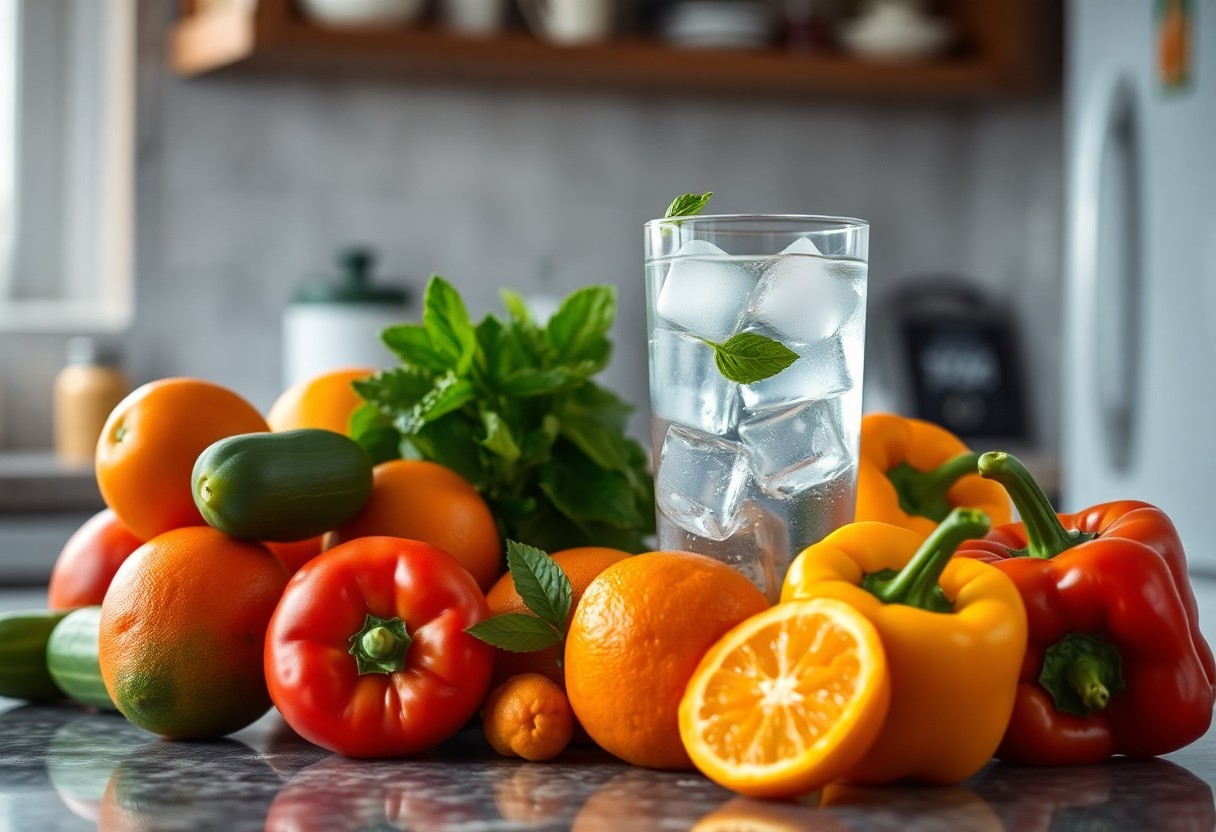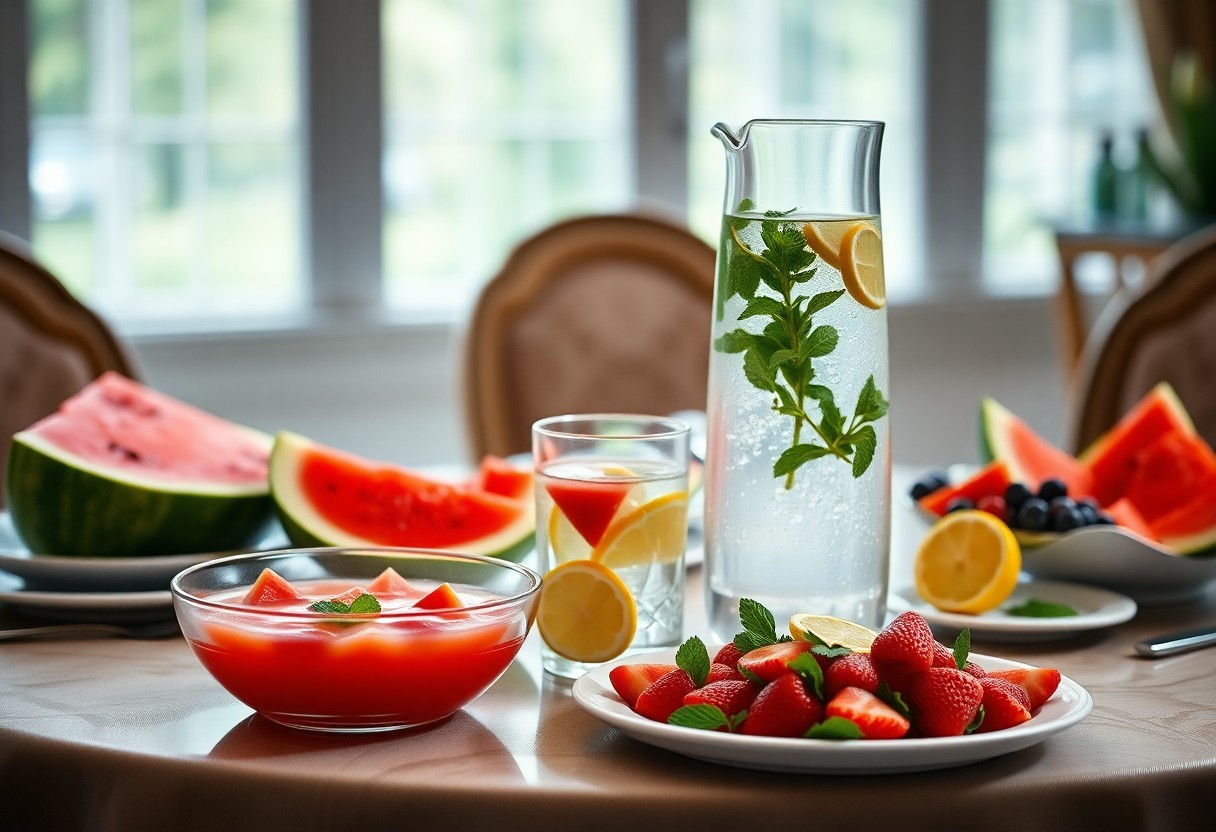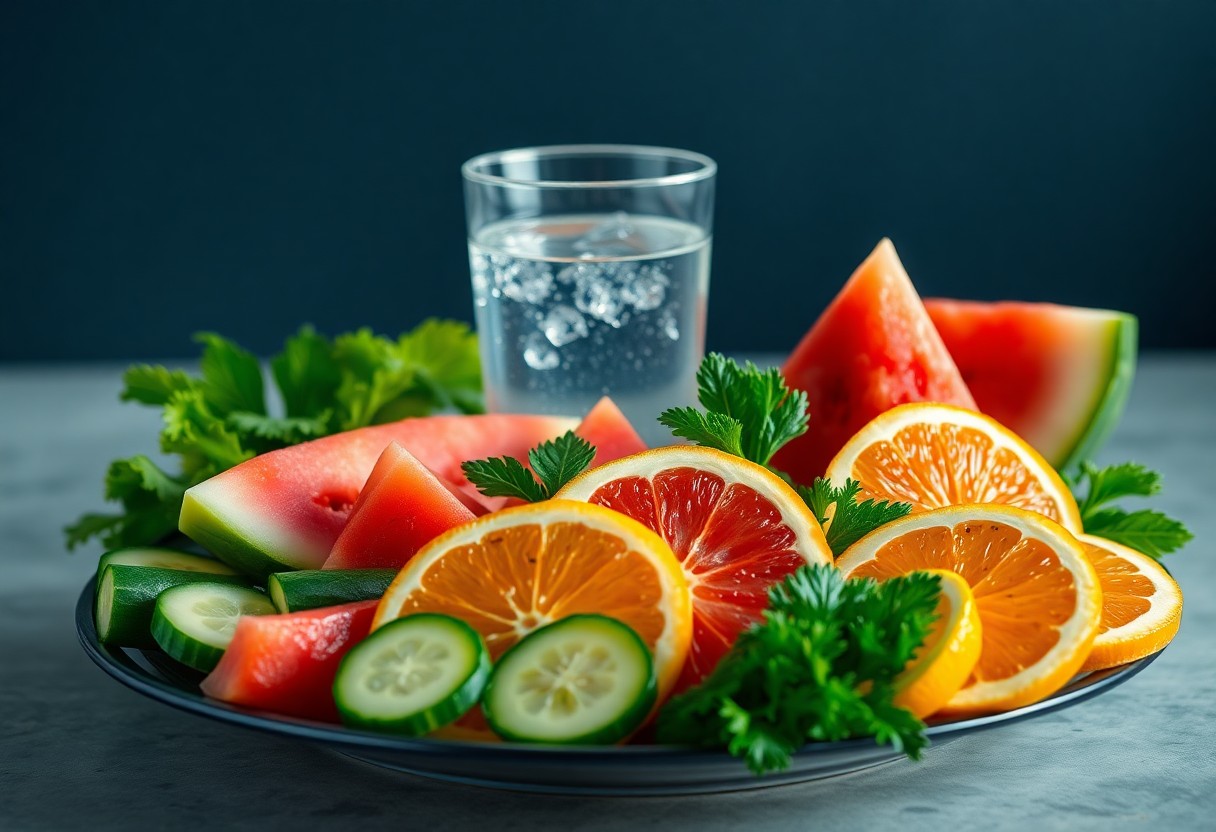There’s a significant advantage to hydrating with food rather than solely relying on drinking water. While water is necessary for your body’s functions, many foods—especially fruits and vegetables—contain high water content that not only quenches your thirst but also provides vitamins, minerals, and fiber. This means that by consuming hydrating foods, you can enhance your overall hydration and support your health more effectively. Additionally, understanding how your body absorbs moisture from food can lead to a more sustained energy level and improved well-being.

Key Takeaways:
- Food, particularly fruits and vegetables, contains a significant amount of water along with necessary nutrients, providing hydration in a more balanced manner than water alone.
- Hydrating foods often come with electrolytes and fiber, which help to maintain fluid balance and improve absorption in the body compared to drinking water by itself.
- Consuming hydrated foods can enhance overall health by delivering vitamins and minerals while supporting hydration, making it easier for the body to replenish fluids effectively.
The Bioavailability Advantage: Food vs. Water
Choosing food to hydrate rather than drinking water alone provides enhanced bioavailability of nutrients. This means that your body can absorb and utilize these nutrients more effectively when consumed through whole foods. Hydrating foods like cucumbers, watermelon, and oranges are packed with necessary vitamins and minerals, which complement their water content. As your body breaks down these foods, it receives not only hydration but also vital nutrients that support optimal function and energy levels.
Nutrient and Electrolyte Contribution
Foods rich in water also contain key nutrients and electrolytes such as potassium, magnesium, and calcium, which are integral for regulating hydration. Consuming fruits and vegetables provides you with these important electrolytes, supporting cellular function and maintaining fluid balance in your body. For instance, a medium banana contains about 422 mg of potassium, which is vital for your heart and muscle functions, making it an excellent choice to replace fluids lost during exercise.
The Role of Fiber in Hydration
Fiber plays a significant role in maintaining hydration because it promotes a healthy gut and regulates the absorption of water within your digestive system. Foods high in fiber, such as legumes, whole grains, and fruits, slow down digestion, allowing your body to retain more moisture. As the fiber absorbs water, it helps form a gel-like substance in the intestines, which maintains hydration levels and can prevent dehydration.
This gel-like matrix not only helps retain water but also encourages healthy bowel movements. Foods like chia seeds and psyllium husk expand when hydrated, further enhancing your body’s water retention capabilities. By incorporating sufficient fiber into your diet, you’ll not only support your hydration needs but also improve your overall digestive health, creating a balanced approach to replenishing fluids and nutrients in your body.
The Role of Natural Hydration Sources
Natural hydration sources, primarily fruits and vegetables, provide an exceptional way to replenish your body’s fluids while delivering vital vitamins and minerals. These foods not only hydrate but also supply electrolytes, fiber, and antioxidants, transforming hydration into a nutrient-rich experience. Your body can better utilize the moisture found in solid foods, leading to improved overall hydration and performance.
Water-Rich Foods That Could Replace a Glass
Several water-rich foods are packed with hydration benefits that can easily replace a glass of water. For instance, a slice of watermelon contains about 92% water, while cucumbers are made up of approximately 95%. Incorporating these into your diet not only keeps you hydrated but also offers a refreshing snack alternative, enhancing your fluid intake without the need for constant glasses of water.
Seasonal Fruits and Vegetables: Nature’s Hydrating Powerhouses
Seasonal fruits and vegetables serve as powerful natural hydrators, adapting with the climate to provide your body with what it needs during hot months. Melons, berries, and greens thrive in summer, delivering high water content and vital nutrients to support your hydration levels. Root vegetables and hearty winter squash transition into a delicious and hydrating choice as they have substantial moisture content when cooked, offering variety throughout the year.
Consider incorporating seasonal produce like cantaloupe, strawberries, and cucumbers in the summer for optimal hydration. Their water content helps you maintain vital fluid levels while providing antioxidants and vitamins critical during hot weather. In winter, opt for sweet potatoes and carrots, which also offer hydration when cooked, keeping you refreshed and energized. Ultimately, embracing seasonal fruits and vegetables not only enhances hydration but also connects you to nature’s cycles, making your food choices more sustainable and nutritious.
An Enduring Solution: How Hydration Food Consumption Affects the Body
Emphasizing food as a hydration source introduces a sustainable and efficacious way to care for your body. Foods rich in water content contribute to overall hydration while also delivering imperative nutrients and minerals that enhance bodily functions. Instead of merely quenching thirst, these hydrating foods create long-lasting benefits, helping you maintain optimal physical and cognitive performance throughout the day.
Sustained Energy Levels and Mental Clarity
Eating hydrating foods fosters stable energy levels and enhances mental clarity. Incorporating fruits and vegetables into your diet can help regulate blood sugar levels, leading to sustained energy without the crashes that often accompany sugary drinks. With a steady supply of water and nutrients, your brain remains alert, improving focus and productivity.
Fostering Digestive Health and Nutrient Absorption
Hydrating foods play a significant role in promoting digestive health. Many fruits and vegetables, such as cucumbers and oranges, not only provide hydration but also contain dietary fiber, which aids in digestion by facilitating regular bowel movements. This combination of hydration and fiber not only supports gut health but also enhances the absorption of imperative nutrients. For example, the water in foods can help dissolve vitamins and minerals, ensuring they reach your bloodstream effectively. Moreover, healthy hydration through food reduces the risk of digestive issues like constipation and bloating, helping you maintain overall comfort and well-being.
Lifestyle Integration: Making Hydration with Food Convenient
Incorporating hydration through food into your daily routine makes it effortless and enjoyable. Stock your kitchen with hydrating snacks like cucumbers, watermelons, and oranges, placing them in visible spots to remind yourself to grab them throughout the day. Meal prepping hydrating fruits and veggies can simplify your choices, helping you opt for nutritious options instead of processed ones. Transforming hydration into a lifestyle means embracing delicious recipes that serve dual purposes—nourishment and hydration—without much additional effort on your part.
Easy Recipes and Snack Ideas for Hydration
Create delightful hydration-packed snacks that are also quick to prepare. Enjoy a refreshing fruit salad with watermelon, strawberries, and mint for a burst of flavor, or blend a green smoothie using spinach, cucumber, and coconut water. Consider making homemade popsicles from blended fruits like mango and kiwi for a fun treat. These options not only hydrate but also satiate your taste buds, making healthy eating a breeze.
Tracking and Adjusting Your Hydration Goals
Monitoring your hydration levels can help fine-tune your intake, guaranteeing you meet your daily needs. Utilize apps or keep a hydration journal to track your progress, noting any physical symptoms of dehydration such as fatigue or headaches. Adjust your goals based on your activity levels, the climate, and even your diet, as certain foods may require more or less water intake. Regularly reviewing your hydration habits allows you to stay on top of your well-being.
Assessing your hydration goals can empower you to find the right balance between drinking water and hydrating foods. Keeping track of your water-rich food intake alongside your fluid consumption provides a clearer picture of your overall hydration strategy. For example, if you find that certain weeks require increased physical exertion, you might shift your focus towards higher quantities of hydrating foods, ensuring your body remains well-hydrated. Tailoring your approach to hydration in response to various lifestyle factors helps maintain optimal health.

The Psychological Edge: Enjoyment and Mindful Eating
When you focus on hydrating through food, you tap into the joy of eating, which creates a more satisfying experience. Each bite becomes an opportunity for mindfulness, allowing you to savor textures and flavors that can turn mealtimes into a moment of pleasure. This enjoyment directly impacts your hydration levels as you’re more likely to consume the recommended servings of hydrating foods, leading to better hydration and overall well-being.
Enhancing the Eating Experience Through Flavor
Flavor plays a pivotal role in your hydration journey. Nature’s hydrating foods, such as sweet watermelon or zesty oranges, not only quench your thirst but also delight your taste buds, making hydration an enjoyable task rather than a chore. By selecting fruits and vegetables with vibrant flavors, you create a multi-sensory experience that encourages you to eat more while staying hydrated.
Cultivating an Appreciation for Hydrating Foods
Gaining a deeper appreciation for hydrating foods involves experimenting with various preparations, flavors, and textures. Trying different recipes, pairing fruits with spices, or adding colorful veggie salads can transform your routine meals into exciting experiences. Each time you explore new ways to integrate hydrating foods into your diet, you foster a connection with the ingredients and enhance your overall hydration.
Cultivating an appreciation for hydrating foods opens the door to a lifelong journey of flavor discovery. By actively seeking out seasonal fruits and vegetables, you not only benefit from their hydration properties but also contribute to a more sustainable lifestyle. Pairing foods based on flavor profiles, such as mixing juicy strawberries with creamy Greek yogurt or tossing crunchy cucumbers with tangy feta, can refresh your palate and keep you engaged. This joy of experimentation helps create a positive relationship with food while naturally increasing your water intake through delicious, hydrating options.
To wrap up
With these considerations, you can understand why hydrating with food can be more effective than relying solely on drinking water. Foods with high water content, like fruits and vegetables, not only provide hydration but also deliver vital nutrients that enhance your body’s overall function. By incorporating these hydrating foods into your diet, you enable a more balanced and sustainable approach to hydration that supports your well-being more comprehensively than water alone.
FAQ
Q: Why is hydrating with food more effective than drinking water alone?
A: Hydrating with food provides not only water but also important nutrients and electrolytes that help maintain proper bodily functions. Foods with high water content, like fruits and vegetables, deliver hydration along with vitamins, minerals, and antioxidants that support overall health, enhancing the hydration process.
Q: What types of foods are best for hydration?
A: Foods that are rich in water include cucumbers, watermelon, strawberries, zucchini, and lettuce. These foods typically contain over 90% water, making them excellent choices for hydration. Additionally, foods like yogurt and soups can also contribute to hydration levels while offering nutritional benefits.
Q: Can hydrating with food help those who struggle to drink enough water?
A: Yes, incorporating hydrating foods into your diet can help individuals who find it challenging to drink sufficient water. Consuming fruits and vegetables can boost overall fluid intake and provide a tasty alternative to plain water, making hydration more enjoyable and accessible.
Q: Are there specific benefits to hydrating with high-water content foods?
A: High-water content foods help create a sense of fullness while providing hydration, which can aid in appetite control. Additionally, these foods often contain fiber, which is beneficial for digestion and can help maintain a healthy weight. The combination of water and nutrients in these foods elevates hydration efforts beyond just drinking water.
Q: How can I incorporate more hydrating foods into my diet?
A: To increase your intake of hydrating foods, include a variety of fruits and vegetables in your meals and snacks. Consider adding fruits to smoothies, making salads with hydrating greens, and opting for soups made with broth and vegetables. Experimenting with new recipes and incorporating these foods into your daily routine can make hydration a delicious part of your diet.
